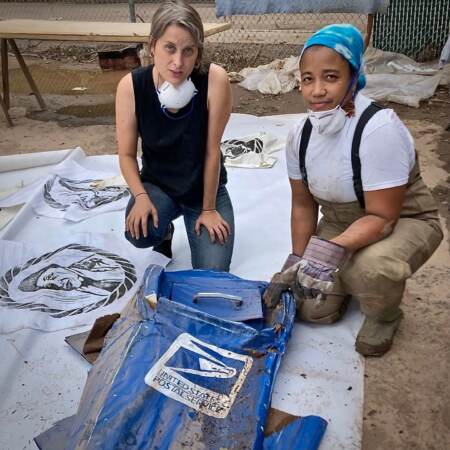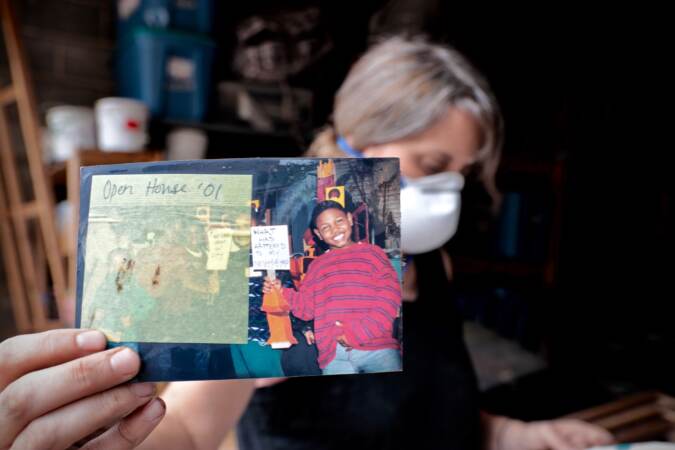After Ida destroyed most of its protest puppetry, Spiral Q takes stock — and gets back to creating
After losing almost all of its 25-year archive of protest puppets to the floods, the Philly nonprofit is making a more focused effort to track the histories of its work.
Spiral Q — the Philadelphia nonprofit that mobilizes communities to advocate for equity through puppetry — has been busy preparing protest signs for Saturday’s Philly Trans March.
At the same time, the organization is still cleaning up and assessing the devastation it suffered when the remnants of Hurricane Ida blew through the region in September. Most of its 25-year archive of puppets and cardboard signs, as well as a great deal of its records and documentation, were destroyed by the floods last month.
That includes one of Spiral Q’s three U.S. Postal Service mailboxes that danced during an election rally last year, when thousands of people gathered at the Pennsylvania Convention Center during the vote count. Caught on video that was shared around the world, the dancing mailboxes became an iconic image that epitomized both the moment in American politics and Philadelphia itself.
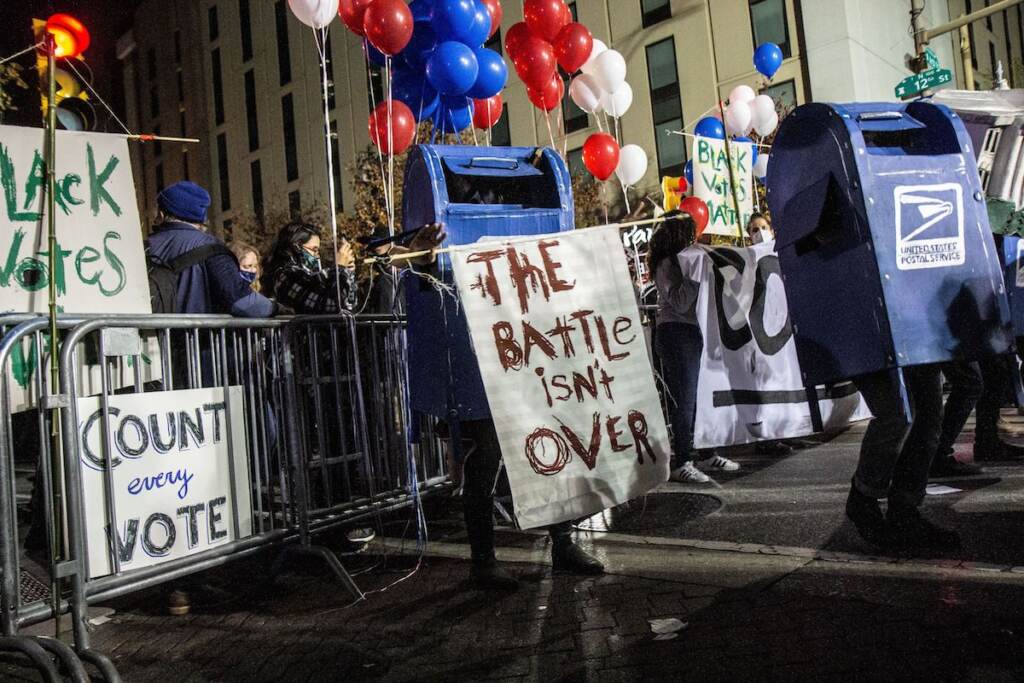
“One is at Central High School because PA Youth Vote and Just Act are doing street theater around this coming election,” said Spiral Q co-director Liza Goodell. “One is in my car over there. It’s destroyed.”
The third mailbox is still enshrined in the Smithsonian Institute. However, Goodell and co-director Jennifer Turnbull estimate Spiral Q has lost about 80% of its material history. Much of what Spiral Q makes is papier-mâché, which has no resistance to water. That includes elaborate pieces of protest art and celebratory puppets created with many hundreds of community members over the last quarter-century.
“We were holding onto it because we know the power of it,” said Turnbull. “Being able to hold that story and hold the community perspectives and messages is the work that everyone needs to be doing. All of the diversity and inclusion work that people are, like, ‘Yeah, we need DEI!’ This is it in action! It is holding the stories of our marginalized communities near and dear, understanding it and knowing its value.”
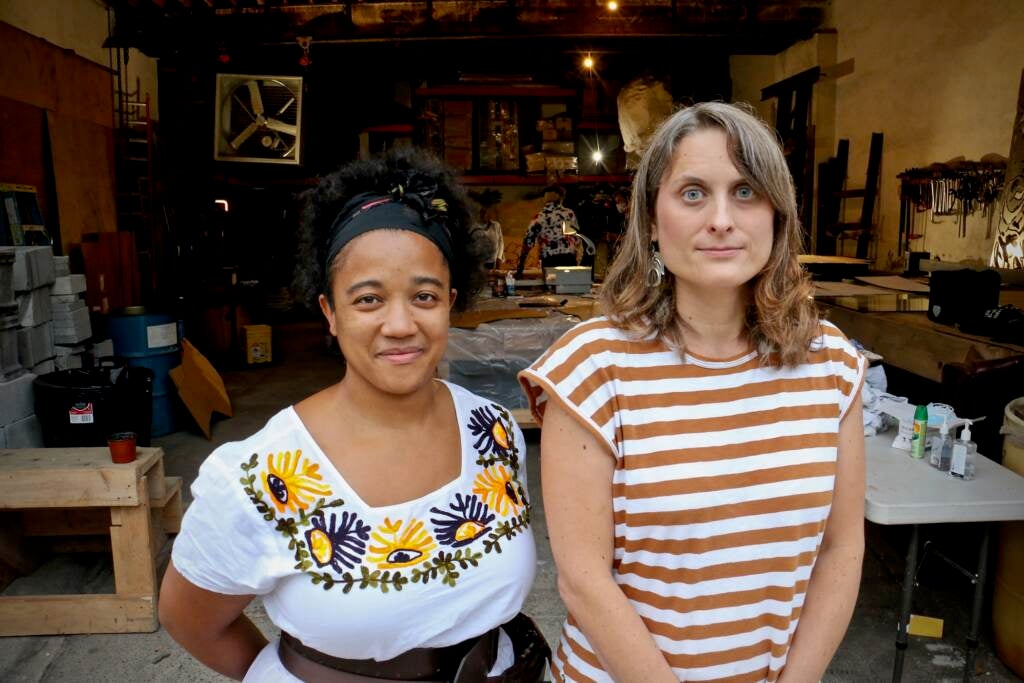
The organization was forced out of its longtime home in Powelton Village last year when the owner sold the building to a developer. The owner offered the group a new storage space near Phoenixville, where Goodell and Turnbull rallied volunteers to relocate hundreds of objects.
That new space is near the banks of the Schuylkill River, which reached 13 feet above flood stage on Sept. 1.
“We have these big pallet racks like you see at Home Depot, and we had two big garages of puppets on pallet racks,” said Goodell. “The racks go up 10 feet high, but the water went seven feet high.”
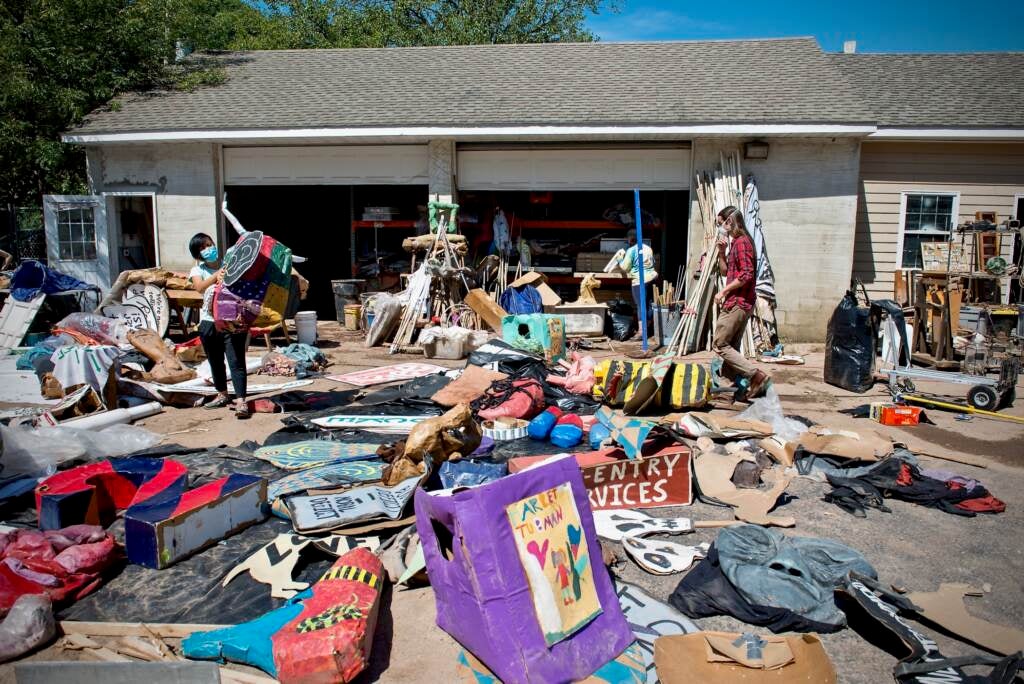
Since 2000, Spiral Q has staged its Peoplehood Parade and street pageant in West Philadelphia, working with community groups to make puppets that reflect their joys and concerns, often in eccentric ways. Many of those did not survive the flood, including a series of house-shaped puppets to be worn, like sandwich boards, by children. They were some of the only giant puppets Spiral Q designed for smaller bodies.
The houses were made for a Peoplehood pageant to represent affordable housing, but then repurposed again and again for whatever was appropriate for the moment.
“They are these wearable houses that the kids all clamor to get into,” said Goodell. “Some kids are, like, ‘I can’t fit in it yet.’ And then next year, maybe when you’re six years old, they can fit it. But those same houses have been used in a lot of rallies and protests around affordable housing. They went to D.C. once, a long time ago, about bringing the troops home.”
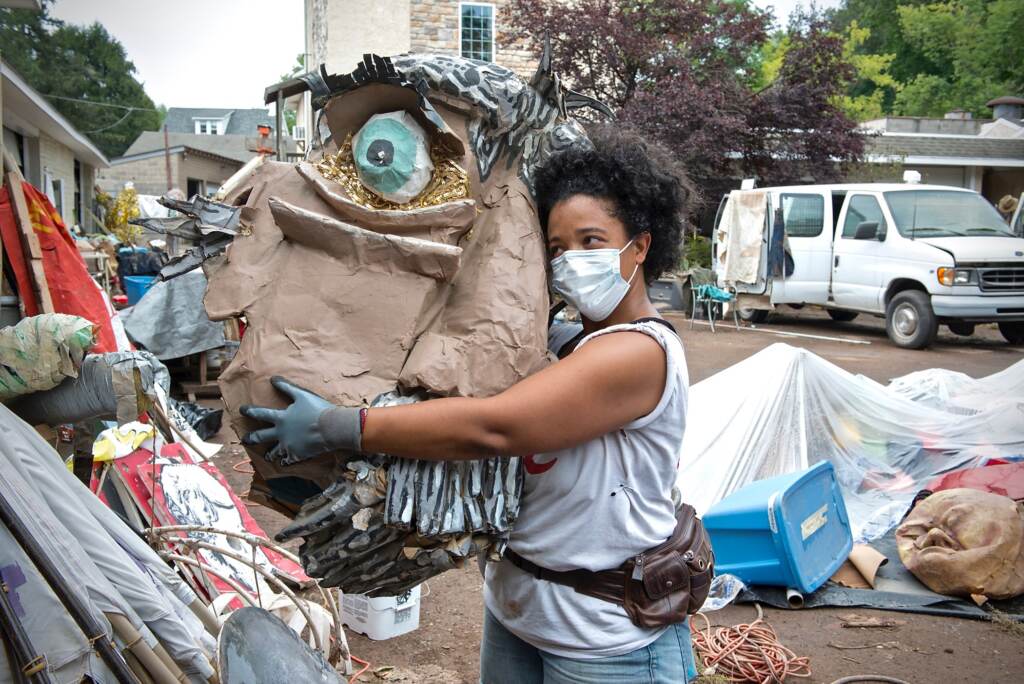
She said those house puppets had also been used to stand off against other puppets representing bulldozers.
“These symbols that are ever-present and, honestly, these issues are reoccurring,” said Goodell. “You look at these puppets and we go one step forward, two steps back.”
Also among the lost pieces are giant cardboard fists painted in black and brown that had been used annually in the Philly Trans March. This week, volunteers from Morris Home, the Philadelphia recovery residence for transgender and gender non-conforming people, came to Spiral Q’s makeshift space in West Parkside to make replacement fists for this weekend’s march.
“I’ve been a screaming queen, gay, whatever you want to call it, for eons. I’ll be 64 this November,” said Najee Gibson, busy painting black outlines into the fist cutouts.
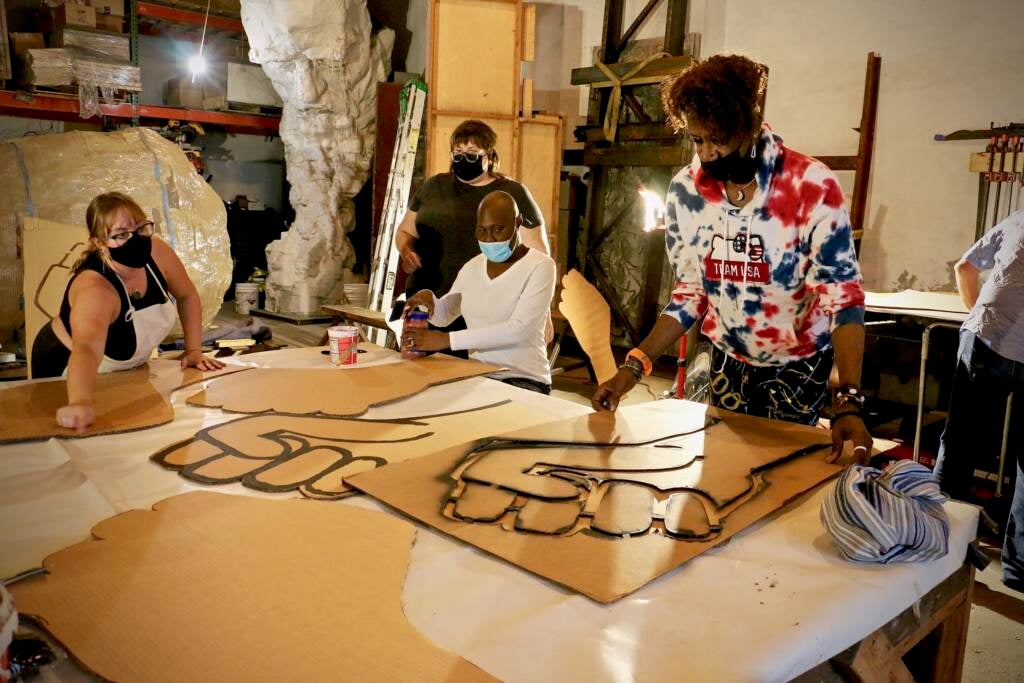
They said that they had been in Philadelphia long enough to witness the Washington Square West section of downtown Philadelphia, known as the Gayborhood, do a “365-degree turn” from its grittier, less gentrified days: “When 13th Street was 13th Street, you know?”
Painting black lines on cardboard cutouts, to replace protest signs lost in a flood, is a small way Gibson is able to hold a community together.
“I’m representing. I’m going to leave something behind. I’m here on this planet. I’m doing what I can to show some love back to the people who had my back,” they said.
In the wake of the flood, Spiral Q is making a more focused effort to track the histories of the puppets it lost and those it still has — like its giant trans unicorn.
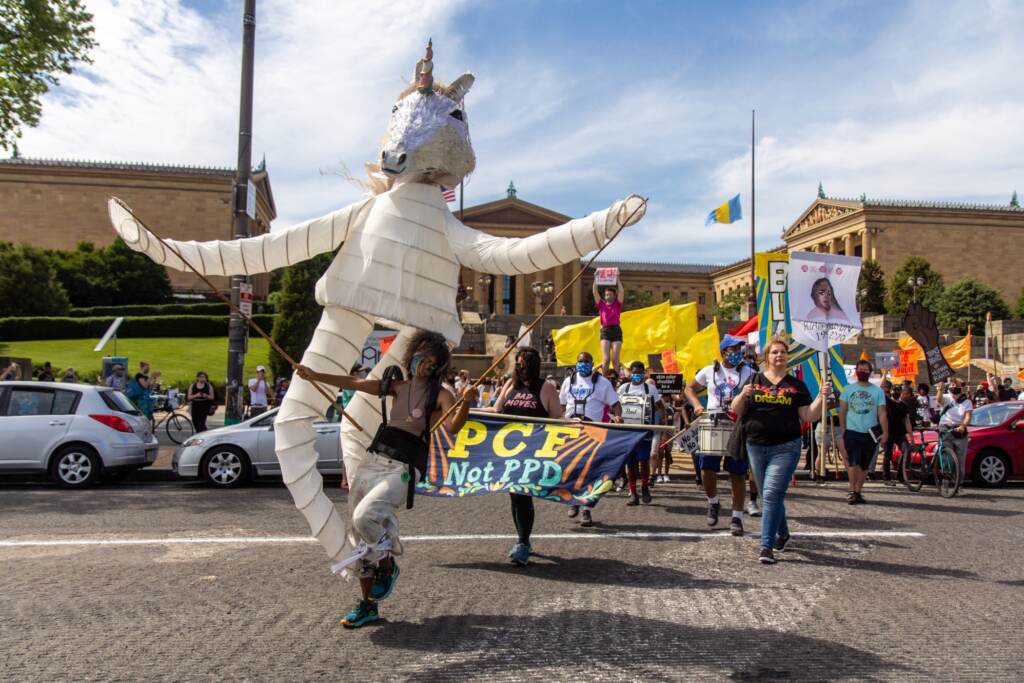
Christian Lovehall, the founder of the Philly Trans March, was participating in a Peoplehood pageant and was asked what kind of joyful puppet would represent himself. Since then, the giant puppet — standing about 10 feet high upright, with limbs operated by poles — has been used for any number of other purposes, rewritten with other meanings.
“The trans unicorn has come out so many times for so many things,” said Turnbull. “It’s come out for a Beyoncé dance challenge. It’s come out to rally folks around arts budget cuts in Philadelphia. It’s come out for a block party.”
“The trans unicorn is a vibe,” said Goodell.
Goodell and Turnbull are gathering, drying out, and sorting hundreds of photographs taken over the last 25 years. That will help Spiral Q identify puppets and people, and fill out a database that will help preserve what the puppets were, who made them, and how they were repurposed over the years.
“We know that our relationships, and the people, are our strongest resources. We are the original capital,” said Turnbull. “Our labor and our love and our connection to one another is the most central and important resource that we have to bear.”

Get daily updates from WHYY News!
WHYY is your source for fact-based, in-depth journalism and information. As a nonprofit organization, we rely on financial support from readers like you. Please give today.







